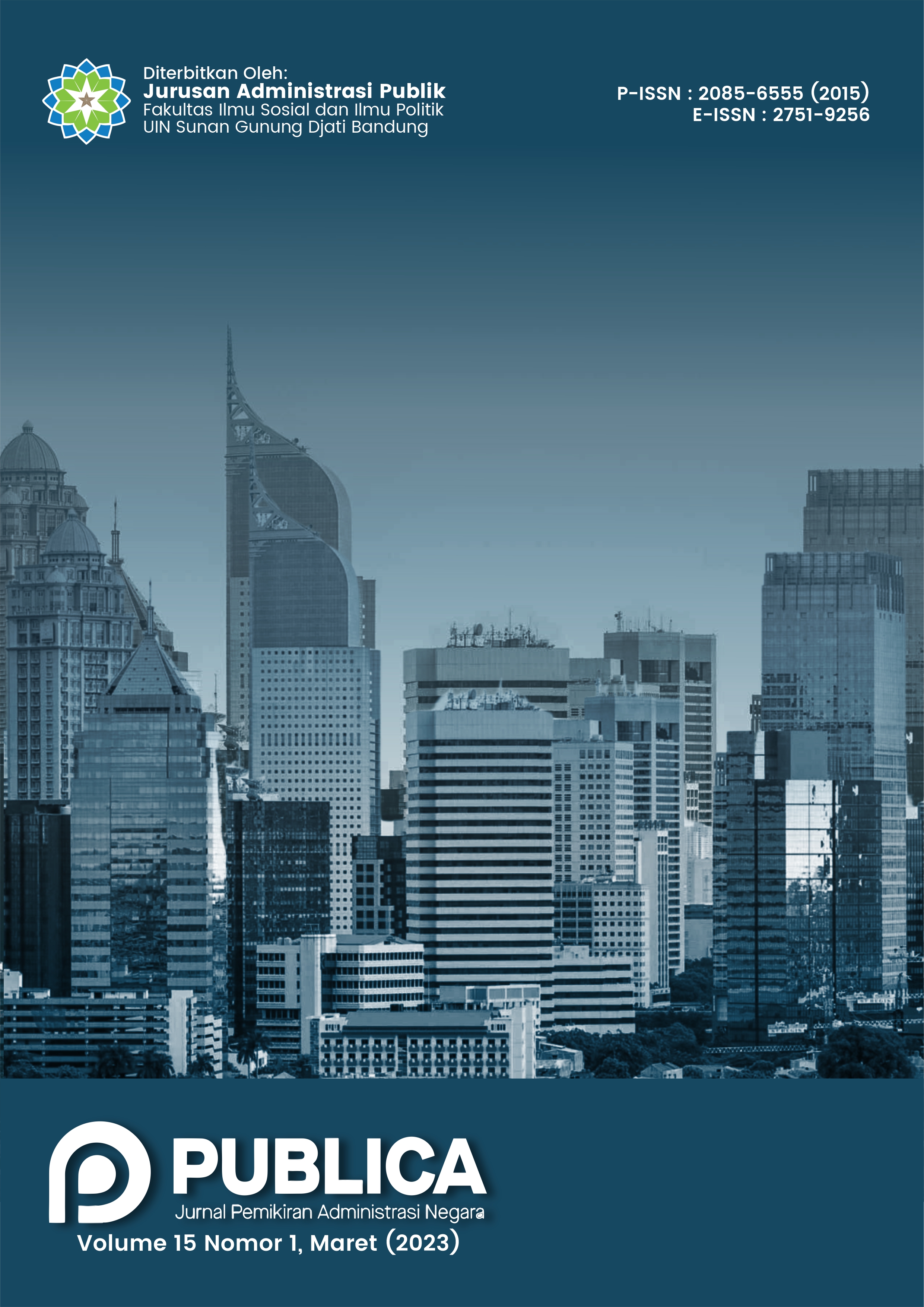Comparative Analysis Of The Factors Affecting The Performance Of Spbe Implementation In The City Of Surabaya And Mojokerto Regency
DOI:
https://doi.org/10.15575/jpan.v15i1.22986Keywords:
Electronic Based Government System, E-government, Local Government, Public PolicyAbstract
The implementation of e-government in Indonesia in 2018 changed its name to the Electronic-Based Government System (SPBE) in accordance with the PERPRES No. 95 of 2018. The implementation of SPBE in Indonesia in 2019 an evaluation was held in each region to find out the extent of the implementation of SPBE in each region in Indonesia. The SPBE evaluation produces an SPBE index which is used as a reference in knowing how far the implementation of the existing SPBE in the area. The high and low value of the SPBE index can be caused by various factors, in this study will discuss the comparison of factors and model factors that affect the performance of the SPBE application in the City of Surabaya and Mojokerto Regency. This study uses EFA analysis to determine the performance factor model in the application of SPBE. For the variables in this study using the results of mapping the Digital Service Provision System of System Framework by Samantha Papavasilou with PERMENPAN No. 59 of 2020 which resulted in 17 indicators. The results of this study Surabaya City and Mojokerto Regency have similarities in performance factors but the two regions have differences in performance factor characteristics where there are several performance factors that are superior to Surabaya City than Mojokerto Regency and vice versa. For the performance factor model, the EFA analysis produces 5 performance factors, namely SPBE regulation, digital literacy, IT infrastructure management, Human Resources and system location.
References
Amalia, Rezha Nur, Ragil Setia Dianingati, and Eva Annisaa’. 2022. “Pengaruh Jumlah Responden Terhadap Hasil Uji Validitas Dan Reliabilitas Kuesioner Pengetahuan Dan Perilaku Swamedikasi.†Generics: Journal of Research in Pharmacy 2(1): 9–15.
Astiarasanti, Amelia Hayyu. 2020. “Pemantauan Dan Evaluasi Teknologi Informasi Di Pemerintahan Kabu Paten Gresik Berdasarkan Peraturan Menteri PAN-RB Nomor 59 Tahun 2020.†UISI Jurnal.
Emerson, Robert Wall. 2017. “Exploratory Factor Analysis.†Journal of Visual Impairment and Blindness 111(3): 301–2.
Firdaus, Muhammad Alif Rifky. 2019. “Evaluasi Implementasi Sistem Pemerintahan Berbasis Elektronik (Spbe) Pemerintah Kabupaten Lumajang Menggunakan Peraturan Menteri Pan-Rb Nomor 5 Tahun 2018 Tentang Pedoman Evaluasi Spbe.†: 69.
Gunawan, Imam et al. 2019. “Validitas Dan Reliabilitas Angket Keterampilan Manajerial Mahasiswa.†Jurnal Administrasi dan Manajemen Pendidikan 2(4): 247–57.
MENPANRB. 2020. “Peraturan Menteri Pendayagunaan Aparatur Negara Dan Reformasi Birokrasi Republik Indonesia Nomor 5 Tahun 2020 Tentang Pedoman Manajemen Risiko Sistem Pemerintahan Berbasis Elektronik.†Direktur Jenderal Peraturan Perundang-Undangan Kementerian Hukum Dan Hak Asasi Manusia Republik Indonesia 5(261): 1689–99.
Mulyadi, Mohammad. 2019. “Penelitian Kuantitatif Dan Kualitatif Serta Pemikiran Dasar Menggabungkannya [Quantitative and Qualitative Research and Basic Rationale to Combine Them].†Jurnal Studi Komunikasi dan Media 15(1): 128.
Nugraha, Joko Tri. 2018. “E-Government Dan Pelayanan Publik (Studi Tentang Elemen Sukses Pengembangan E-Government Di Pemerintah Kabupaten Sleman).†Jurnal Komunikasi dan Kajian Media 2(1): 32–42. https://jurnal.untidar.ac.id/index.php/komunikasi/article/view/758 (June 13, 2022).
Papavasiliou, Samantha. 2020. “A Digital Transformation Governance Framework for EGovernment: A Systemic Approach.†https://digital.library.adelaide.edu.au/dspace/handle/2440/126968.
Sugiyono. 2018. “Metode Penelitian Kuatintatif, Kualitatif Dan R & D.†Bandung: Alfabeta 15(2010).
Sukemi, and Teti Trisnawati. 2021. “Analisis Confirmatory Factor Analysis (Cfa) Dan Exploratory Factor Analysis (Efa) Pada Pengembangan Instrumen Motivasi Belajar Sekolah Dasar.†Journal Abacus 2(1996): 6.
Watkins, Marley W. 2018. “Exploratory Factor Analysis: A Guide to Best Practice.†Journal of Black Psychology 44(3): 219–46.
Downloads
Published
Issue
Section
License
Authors who publish with this journal agree to the following terms:
-
Authors retain copyright and grant the journal the right of first publication, with the work simultaneously licensed under an Attribution-ShareAlike 4.0 International license that allows others to share the work with acknowledgment of the work's authorship and initial publication in this journal.
-
Authors may enter into separate, additional contractual arrangements for the non-exclusive distribution of the journal’s published version of the work (e.g., posting it to an institutional repository or publishing it in a book), with acknowledgment of its initial publication in this journal.
-
Authors are permitted and encouraged to post their work online (e.g., in institutional repositories or on their personal websites) prior to and during the submission process, as this can lead to productive exchanges and earlier, greater citation of the published work (see The Effect of Open Access).
